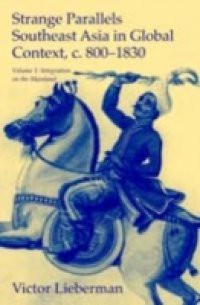This ambitious work has two novel goals: to overcome the extreme fragmentation of early Southeast Asian historiography, and to connect Southeast Asian to world history. Combining careful local research with wide-ranging theory Lieberman argues that over a thousand years, each of mainland Southeast Asia's great lowland corridors experienced a pattern of accelerating integration punctuated by recurrent collapse. These trajectories were synchronized not only between corridors, but most curiously, between the mainland as a whole, much of Europe, and other sectors of Eurasia. He describes in detail the nature of mainland consolidation - which was simultaneously territorial, religious, ethnic, and commercial - and dissects the mix of endogenous and external factors responsible. Here, then, is a fundamentally original analysis not only of Southeast Asia, but of the pre-modern world.



















